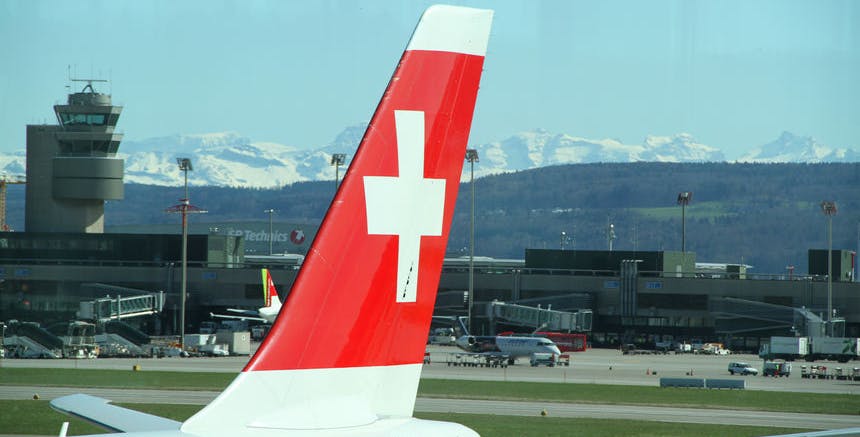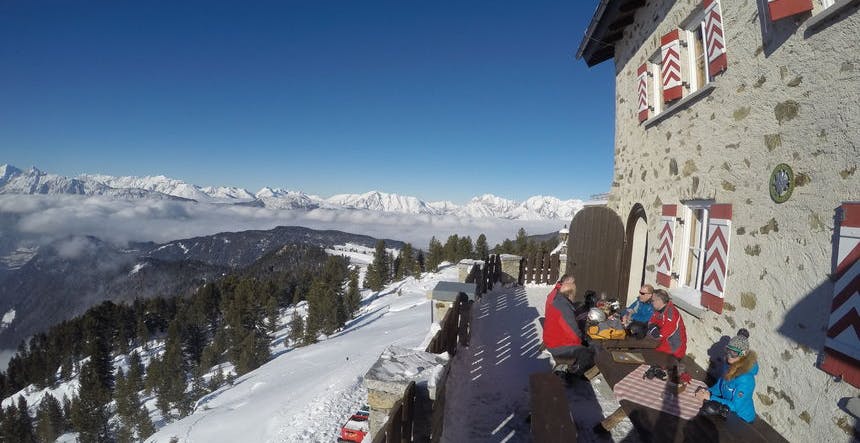Travel Tips for Ski Trips to the Alps

Planning your first ski trip to the Alps is exciting and loaded with ski travel do's and don'ts. Do consider using the train system - it is incredibly efficient. Don't over-pack as you will be lugging your ski gear and luggage from the plane to the train to the gondola and tram. Here are some transportation and travel trips for your ski trip to The Alps:
Traveling to Europe for your Ski Trip
Depending upon where in Switzerland, Austria, France, Italy, or Germany, you plan to ski, your gateway cities will likely be Geneva, Zurich*, Munich, or Milan. Our experiences traveling to Austria and Switzerland have proven public transportation (trains and buses) to be so efficient that you do not need to rent a car. With a Swiss Pass, there is no stress of driving. Many ski villages are car-free as well, so once you arrive, everyone uses ski lifts and buses exclusively. Additionally, car rentals in Europe are considerably more expensive than in the US, and driving directions and signage are challenging at best.
Tip: If you do decide to rent a car for your ski trip, be sure to download appropriate European maps (like Google Maps) in advance as they will be very helpful.

We recommend overnight flights from the US, you arrive early in the morning to Zurich or Geneva and can be skiing by noon in the Alps.
*Zurich Airport Tip: Flying into Zurich, after you get your luggage, walk across the airport and go down two sets of escalators to catch the 10-minute metro train to Zurich Train Station - Zurich Bahn (they run about every 10 minutes). From here you can catch all major train connections to outlying ski destinations across Switzerland and into Austria.
Swiss Air
We enjoyed the direct flight aboard Swiss Air to Zurich. It's the only airline we could find that offers a direct flight (from Boston), and we were able to use our United frequent flyer card to acquire mileage points from these flights as they are allied partners.
Swiss Pass
On our ski trips to Switzerland, we purchase a Swiss Pass for unlimited train and bus service. While first class is not necessary since all the trains are clean and prompt, the 1st class upgrade is a nice luxury, these compartments are less crowded, with more room for your luggage to stretch out and enjoy the scenery. We found ski resorts with direct train access, like St Anton, Zermatt, Aletsch Arena, Verbier, Gstaad, Engelberg, and Jungfrau ski region with train connections right into the ski village to be most convenient. Other ski resorts are connected by train followed by bus service. We found this Swiss Train Schedule site immensely helpful in planning our ski trip using Swiss trains and buses. Your Swiss Travel Pass entitles you to free admission to over 480 museums.
Money for your Ski Trip to the Alps
There is no need or benefit to exchange your money in advance or at the airport (you will pay huge fees both at your local bank, and your departing or arrival airport). Once you are in your first town, train station, or city, use an ATM in Europe for the best exchange (do notify your US bank and credit card companies of your travel in advance). Credit cards (MasterCard and Visa) are widely accepted, although some amazing remote mountain chalets only take cash so be sure to check and have Euro for France, Austria, and Italy, or Swiss Francs. When your bill arrives and the server asks if you wish to pay in the US or local currency, opt to pay in the local currency for the best exchange rates.
Languages spoken in the Alps
You will be exposed to several cultures and languages in the Alps - primarily French and German speaking, however, most people in tourist areas speak English and welcome Americans and English. The Swiss Alps, for example, are almost quadrilingual, some ski resorts are German-Swiss like Zermatt, while Verbier is predominately French-speaking. Skiing in Zermatt, you can ski to Cervinia Italy, order lunch in Italian, and return to speaking German at dinner back on the Swiss side. Gstaad is French on the west side and German to the East. Make an effort to learn a few common phrases as it's polite and appreciated to use the basics - Bitte, Danke, Merci, Grazie!
Packing for a Ski Trip in the Alps
When traveling to the Alps for skiing, we highly recommend you travel as lightly as possible, since you will be transporting your ski gear and luggage from planes to trains to buses, and even taking trams to alpine villages that are completely car-free. See our ski packing tips on the necessities. We always bring our own ski boots, for comfort and performance reasons. You can rent skis or bring your own - depends on how much you love your gear and how many ski resorts you plan to visit. We recommend boot and ski bags with wheels, rolling luggage through airports, train and bus stations will take some of the weight off your shoulders - and allows you to make quick connections between trains that are timed efficiently often within 5-15 minutes for swift travel.
Adapters and Converters
You will need adapters/converters (110-220v) for any US electronics, shavers, blower dryers, boot dryers, etc., that you bring to Europe. Most laptops have built-in converters. Check with your ski hotel to see if they provide a ski boot drying room (most do) and hair dryers to save having to pack these overseas, then you don't have to worry about blowing a fuse or appliance (says the ski writer who melted her boot dryer sticks - but fortunately her ski boots were not nuked).
Glossary of Ski Terms in The Alps
Piste - Ski Trail that is groomed
Off-Piste- Skiing out of bounds, side-country or backcountry terrain that is not groomed or monitored
Prepared - groomed slopes
Cable Car - any ski lift that runs on cables, gondola, tram, chairlift, even t-bar
Snow Cannon- Snowmaking guns
Ski Sticks or Batons - ski poles
Schnee, Neige - Snow in German and French
Planche, Surf - snowboard
Schuss, Sciasse - to ski
Blue, Red, Black - Trail designation progression, like US Green, Blue and Black Diamond rating
Orange - extremely difficult off piste terrain, designated with a dotted line
